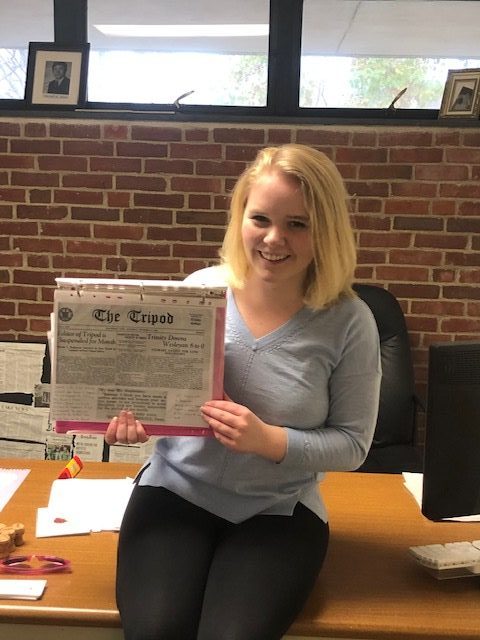By Brendan W. Clark ’21
Editor; History Major
Gillian Reinhard ’20 is the President’s Fellow in History, the Department’s inaugural Chatfield Fellow, and a senior thesis writer. History@Trinity’s Brendan Clark sat with Gillian to ask her a few questions about her thesis and her experience with the History Department.


- Describe your research topic in two minutes or less.
I am looking at the 1926 opera Turandot, by the Italian composer Giacomo Puccini. The first part of my thesis concerns how different cultures portrayed exoticism and embraced Edward Said’s concept of Orientalism. I am applying what I have learned in the first chapter to look specifically at how British audiences perceived Puccini’s opera when it arrived in London a year later, again from the perspective of Orientalism. The relationship between Britain and China is a unique one, with a long, complicated history, and I am hopeful that an analysis of this opera can shed light on this relationship.
- What specific aspects of your academic career at Trinity and your personal historical interests led you to select this topic?
Firstly, I have studied Mandarin Chinese since middle school and had the opportunity to study abroad in Shanghai during the fall of my junior year. My experience abroad truly shed light on the concept of Orientalism in the West. Also, I read Orientalism, by Edward Said, in my first-year seminar “Arabian Nights” with Associate Professor of History Zayde Antrim. That text has shaped much of my academic work. I decided to look at it through the lens of opera, as it has always been a quirky interest of mine.
- How has the History Department assisted with your research and what does your designation as “Chatfield Fellow” offer you?
I feel that taking the courses “What Is History” and “History Workshop” have solidified my passion for complex understandings of history, as well as confidence in my research abilities to undertake a lengthy paper. The Chatfield Fellowship is named in memory of Jack Chatfield ’64, a Trinity alumnus and beloved professor. Chatfield was also a part of the Tripod while a student, which makes it especially meaningful to me, as I have been Editor-in-Chief for four semesters. The Chatfield Fellowship provides a research fund for a student undertaking thesis research. I am currently in the throes of research for my chapters on Britain and am hoping to plan a trip to London in January, which would not be possible without the fund.
- What challenges have you come across as you have commenced work on your thesis?
In the context of my own thesis, operatic studies are generally consigned to the realm of musicologists. One of the great things about opera, however, is that it is a wholistic art form: thus, I have been able to research costumes, libretti, settings, press releases, etc. So. although many of the secondary sources focus on the music, I have been able to examine closely primary sources and illumine more of the story. Having confidence in yourself to undertake such a significant project is also very important.
- What else are you up to in the world of history?
Great question, Brendan! I am working with you and other members of the department on the Trinity Bicentennial History Project. I am fascinated by Trinity’s institutional history and feel that it is our duty to become more informed about our past. Being on the Tripod has given me a front-row seat to how history is preserved and remembered at the college. As we approach two-hundred years, it is something we should be proud of, but also recognize requires deep contemplation. I love reading old issues of the Tripod and I have spent several years documenting its history, collecting clippings and writing a narrative of its past in a binder.
- What is your favorite aspect of the Tripod’s history?
Oh gosh, there are so many! It is incredible to look at the list of Editor-in-Chiefs of the Tripod and realize that for over fifty years of its existence, it was run entirely by men. The first female Editor-in-Chief was from the Class of 1973 and she did a great job! Additionally, the Tripod has a fascinating past: in the 1920s, the Tripod’s Editor-in-Chief was suspended for writing an editorial critical of Dean Troxell, under the administration of then-President Remsen Brinkerhoff Ogilby. It would be crazy to imagine that happening today!
- What advice would you give prospective history majors?
I think history is a great major! It has taught me how to write well, think critically, and argue effectively. For me, it was a no-brainer to complete my degree with a second major in International Studies. I would encourage students to explore their options and always say “yes” to academic opportunities.
- If you could be one figure from history, who would it be and why?
I would be Elizabeth I at the beginning of Shakespeare’s career or at the defeat of the Spanish Armada. I love the Tudors!